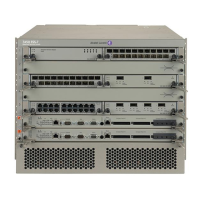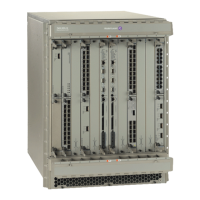VRRP Configuration Command Reference
420 Router Configuration Guide
The operational state of the entity is disabled as well as the operational state of any entities contained
within. Many objects must be shut down before they may be deleted.
The no form of this command administratively enables an entity.
Special Cases Non-Owner Virtual Router — Non-owner virtual router instances can be administratively
shutdown. This allows the termination of VRRP participation in the virtual router and stops
all routing and other access capabilities with regards to the virtual router IP addresses.
Shutting down the virtual router instance provides a mechanism to maintain the virtual routers
without causing false backup/master state changes.
If the shutdown command is executed, no VRRP advertisement messages are generated and
all received VRRP advertisement messages are silently discarded with no processing.
By default, virtual router instances are created in the no shutdown state.
Whenever the administrative state of a virtual router instance transitions, a log message is
generated.
Whenever the operational state of a virtual router instance transitions, a log message is
generated.
Owner Virtual Router — An owner virtual router context does not have a shutdown command.
To administratively disable an owner virtual router instance, use the shutdown command
within the parent IP interface node which administratively downs the IP interface.
ssh-reply
Syntax [no] ssh-reply
Context config>router>if>vrrp
Description This command enables the non-owner master to reply to SSH requests directed at the virtual router
instance IP addresses. This command is only applicable to IPv4.
Non-owner virtual router instances are limited by the VRRP specifications to responding to ARP
requests destined to the virtual router IP addresses and routing IP packets not addressed to the virtual
router IP addresses.
This limitation can be disregarded for certain applications. Ping, Telnet and SSH can be individually
enabled or disabled on a per-virtual-router-instance basis.
The ssh-reply command enables the non-owner master to reply to SSH requests directed at the virtual
router instances IP addresses. The SSH request can be received on any routed interface. SSH must not
have been disabled at the management security level (either on the parental IP interface or based on
the SSH source host address). Proper login and CLI command authentication is still enforced.
When ssh-reply is not enabled, SSH requests to non-owner master virtual IP addresses are silently
discarded.
Non-owner backup virtual routers never respond to SSH requests regardless of the ssh-reply setting.
The ssh-reply command is only available in non-owner vrrp nodal context.
